As cat lovers, we know that our feline friends are more than just pets – they’re family. And when our furry family members aren’t feeling their best, it can be a cause for concern. Especially when it comes to diarrhea. But what if your cat seems perfectly fine otherwise? Is it something to worry about, or is it just a minor hiccup in their digestive system?
The truth is, diarrhea in cats can have various causes, and even seemingly healthy cats can experience this unpleasant symptom from time to time. As responsible pet owners, we must know what steps to take when our cats are experiencing digestive distress.
In this blog post, we’ll explore what you should do if your cat has diarrhea but seems otherwise healthy. We’ll cover the common causes of diarrhea in cats, the signs that it may be something more serious, and most importantly, how you can help your furry friend get back on track.
Whether you’re a seasoned cat owner or new to the world of feline friends, don’t worry – we’ve got you covered. This post will provide you with all the knowledge and tools you need to keep your cat healthy and happy – even when their digestive system isn’t cooperating. So let’s dive in and tackle this common concern head-on.
Causes of Diarrhea in Cats
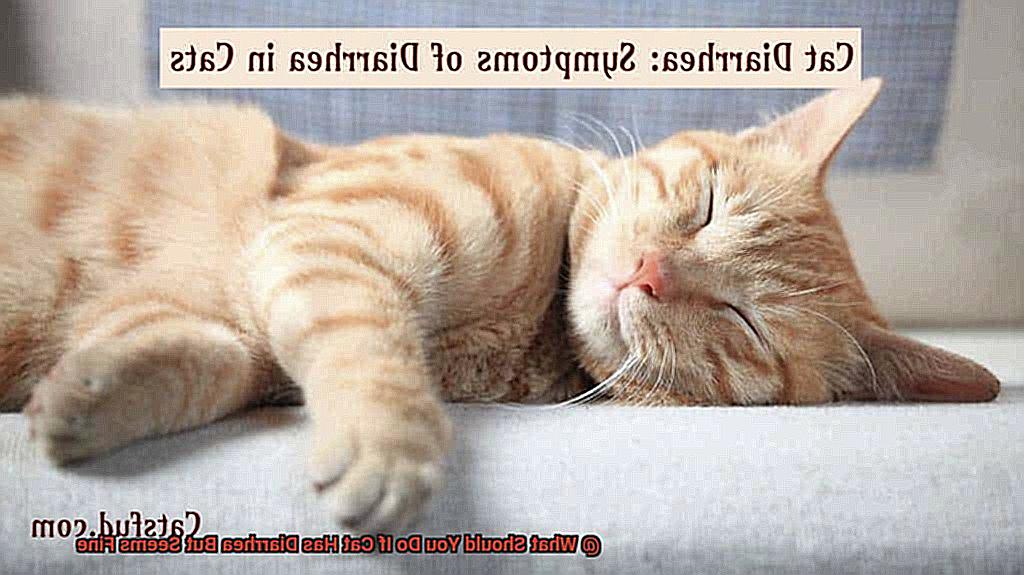
Unfortunately, diarrhea is a common issue that many cats face. While it can range from mild to severe, it’s essential to know the causes of diarrhea in cats and how to manage it.
One of the most typical culprits of diarrhea in cats is dietary changes. Whether it’s a new brand of food or table scraps, changes in diet can upset your cat’s stomach and cause diarrhea. Similarly, consuming spoiled or contaminated food can also lead to digestive issues.
Infections are another common reason for diarrhea in cats. Bacterial, viral, or fungal infections can irritate the lining of the intestines and lead to diarrhea. Parasites such as worms or protozoa can also be responsible for causing diarrhea.
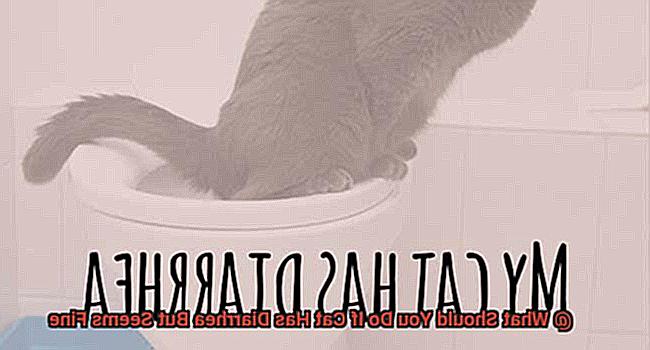
Stress is another significant factor that can lead to digestive upset in cats. Moving homes, introducing a new pet or family member, or changes in routine can all cause stress and lead to diarrhea. It’s important to recognize these potential triggers so you can help minimize your cat’s stress levels.

It’s important to note that diarrhea can also be a symptom of an underlying health issue. If your cat experiences chronic diarrhea or other symptoms accompany the diarrhea, it’s essential to consult with a veterinarian for proper diagnosis and treatment.
In the meantime, there are steps you can take at home to help alleviate your cat’s symptoms. Switching your cat to a bland diet of boiled chicken and rice or consulting with your vet about specially formulated gastrointestinal diets can help. Providing plenty of fresh water and electrolytes can also help prevent dehydration.
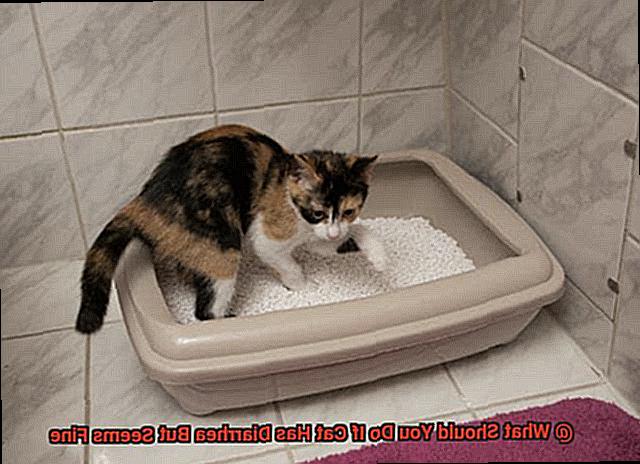
Lastly, make sure your cat’s litter box is clean and accessible. Cats with diarrhea may need to use the litter box more frequently than usual, so keeping it clean and within reach can help prevent accidents.
In conclusion, by knowing the causes of diarrhea in cats and taking preventative measures, you can help your furry friend avoid this unpleasant issue. If your cat does have diarrhea, monitor their behavior closely, and take steps at home to alleviate their symptoms.
Signs and Symptoms to Monitor in Your Cat

One of the most common symptoms that may indicate an underlying issue is diarrhea. Although occasional bouts may not be alarming, chronic or severe diarrhea can cause dehydration and other complications.
Aside from diarrhea, there are other signs and symptoms to monitor in your cat. Changes in appetite, weight loss, vomiting, lethargy, and dehydration are red flags that require immediate veterinary attention. Your veterinarian may recommend diagnostic tests such as blood work, fecal exams, or imaging studies to determine the root cause of your cat’s symptoms.
Even if your cat seems perfectly fine despite experiencing diarrhea, it’s still important to closely observe their behavior and consult with your vet if you notice any concerning changes. If your cat has diarrhea but no other symptoms, you may be able to alleviate their discomfort by modifying their diet and ensuring they have plenty of water. However, if their diarrhea persists for more than a few days or becomes severe, seek veterinary attention promptly.
Seeking Veterinary Care for Cat Diarrhea
When your cat experiences diarrhea, it’s natural to feel concerned and wonder whether they need veterinary care. The answer is yes, seeking professional help is crucial.
If your cat’s diarrhea persists for more than 24-48 hours or if there are other symptoms present, seeking veterinary care is a must. Even if your cat appears fine, there could be underlying health issues that require attention. Your veterinarian will perform a physical examination and may recommend diagnostic tests such as blood work, fecal tests, and imaging studies to determine the underlying cause of the diarrhea.
It’s important to note that some causes of diarrhea in cats can be serious and even life-threatening if left untreated. These include infections, inflammatory bowel disease, parasites, and cancer. Seeking veterinary care early on can help ensure prompt diagnosis and treatment, which can improve your cat’s chances of a full recovery.
Depending on the underlying cause of the diarrhea, treatment options may include medication, dietary changes, and supportive care such as fluid therapy. Your veterinarian may also recommend monitoring your cat’s hydration levels and adjusting their diet temporarily.
In addition to getting professional help, it’s essential to monitor your cat’s hydration levels and offer plenty of water to prevent dehydration. You may also need to adjust your cat’s diet temporarily by offering a bland diet or specialized food recommended by your veterinarian.
In summary, seeking veterinary care for your cat’s diarrhea is vital for their health and well-being. Don’t hesitate to reach out to your veterinarian if you have any concerns or questions about your cat’s symptoms. Remember that early intervention can lead to a faster and more complete recovery for your beloved feline friend.
Home Remedies for Cat Diarrhea
When it comes to managing mild cases of diarrhea, there are some effective home remedies that can help alleviate symptoms. However, it’s crucial to keep in mind that for severe cases, medical attention from a veterinarian is necessary.
Here are five home remedies that can help soothe your cat’s upset stomach:
Probiotics: These friendly bacteria can help restore balance in the gut and regulate digestion. You can find probiotics in supplements or in foods like yogurt, which can be added to your cat’s diet.
Pumpkin: Canned pumpkin is an excellent source of fiber that can aid digestion. Remember to use plain pumpkin and avoid pumpkin pie filling that contains added sugars.
Boiled Chicken and Rice: This bland meal is gentle on the stomach and can help soothe irritation. However, it should only be given for a short period of time and not as a long-term solution due to its lack of necessary nutrients.
Electrolyte Replacement: Diarrhea can cause dehydration and an imbalance of electrolytes in the body. Electrolyte replacement solutions like Pedialyte can help restore these imbalances.
Hydration: Encouraging your cat to drink plenty of water is essential to prevent dehydration. Adding water to their food or using a pet fountain can help increase their water intake.
Remember to monitor your cat’s symptoms and consult with your veterinarian if the diarrhea persists or worsens. While these home remedies are helpful for mild cases, severe diarrhea requires professional medical intervention.
Diet Changes for Cat Diarrhea
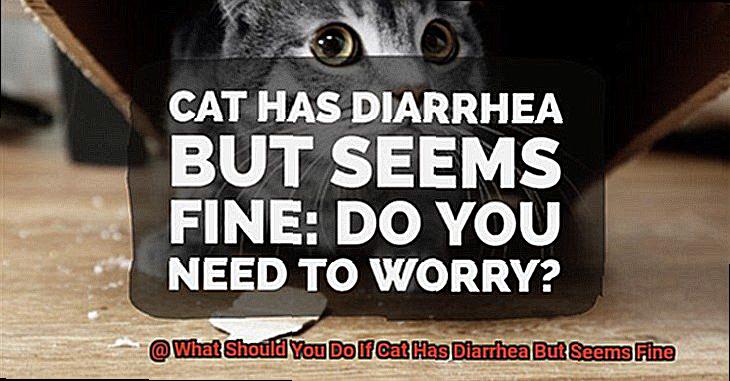
However, by making the right diet changes, you can alleviate symptoms and restore your cat’s digestive health.
It’s essential to introduce new foods gradually to avoid further upsetting your cat’s stomach. Opt for small, frequent meals throughout the day rather than two larger meals.
A bland diet of boiled chicken and rice or boiled hamburger and sweet potato is often recommended for cats with diarrhea. These easily digestible foods can help regulate bowel movements. Alternatively, a high-fiber diet can help absorb excess water in the intestines.
Avoid feeding your cat dairy products as they are lactose intolerant and consuming dairy can worsen diarrhea symptoms. High-fat or spicy foods should also be avoided as they can upset their stomach.
When in doubt, consult with your veterinarian for personalized recommendations. They may recommend a prescription diet or supplements to manage your cat’s diarrhea effectively. Hydration is also crucial, so make sure to provide your cat with plenty of fresh water.
Managing cat diarrhea with the right diet changes can make a significant difference in your cat’s overall health and well-being. Remember to introduce new foods gradually, avoid dairy and high-fat foods, and consult with your veterinarian for personalized recommendations.
Keeping the Litter Box Clean and Accessible
That’s why it’s crucial to scoop the litter box daily and completely change the litter every 1-2 weeks. Not only will this keep your cat healthy, but it’ll also prevent any unpleasant odors from wafting through your home.
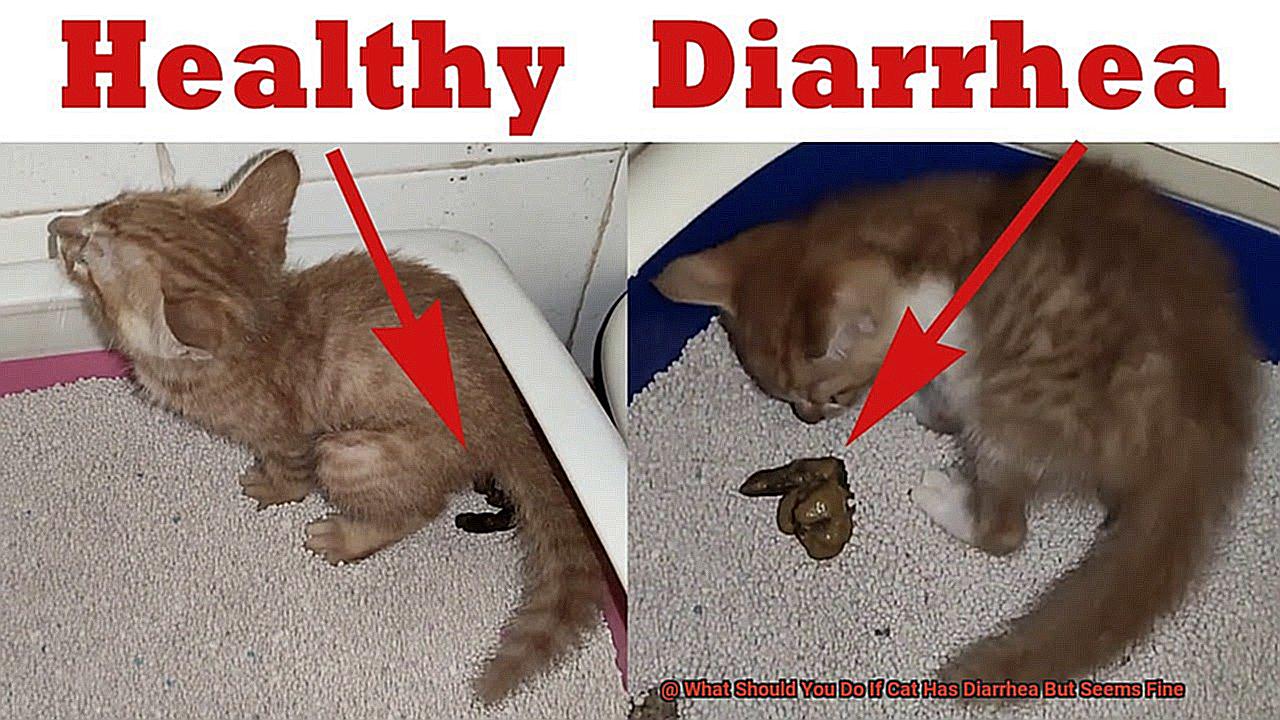
When it comes to accessibility, cats are just like us – they prefer some privacy when using the toilet. So, it’s important to place the litter box in a quiet and private area of your home.
Avoid high-traffic areas or places near noisy appliances, like washing machines or dryers, as this can create anxiety for your cat. Additionally, make sure there are no obstacles blocking your cat’s path to the litter box and that it’s easy for them to get in and out of, regardless of their age or size.
If your cat is experiencing diarrhea or other health issues, taking extra care to keep the litter box clean is essential. Scoop the litter box several times a day to remove any loose stools and consider using disposable liners for easy cleanup.
If your cat has difficulty accessing the litter box due to health issues, like arthritis or mobility problems, consider providing a low-sided litter box or adding a ramp for easier access.
Remember, keeping the litter box clean and accessible is vital for maintaining your cat’s overall health and well-being. By following these simple tips, you’ll not only prevent any litter box-related health issues but also keep your feline friend feeling their best.
Over-the-Counter Medications to Avoid
Treating your cat’s diarrhea with over-the-counter medications can be risky without consulting with a veterinarian. Many medications that are safe for humans can be harmful or even toxic to cats, so it’s important to be cautious.
One popular medication that should be avoided is Pepto-Bismol. While it may seem like a quick fix for your cat’s upset stomach, it contains salicylates that are toxic to cats. Furthermore, anti-diarrheal medications containing loperamide or opioids should never be given to cats as they can cause serious side effects such as lethargy, vomiting, and constipation.
So what should you do if your cat has diarrhea? Instead of turning to over-the-counter medications, focus on managing your cat’s diarrhea through diet and hydration. Offering small, frequent meals of easily digestible foods such as boiled chicken and rice can help soothe their digestive system. Also, ensuring your cat has access to clean water at all times can help prevent dehydration.
It’s vital to avoid giving your cat any human medications without consulting with a veterinarian first. Medications such as antibiotics and pain relievers can have different dosages and side effects in cats compared to humans.
If your cat’s diarrhea persists for more than a day or two, or if they show any other symptoms such as vomiting or lethargy, contact a veterinarian for proper diagnosis and treatment.
Prevention Tips for Cat Diarrhea
With the right preventative measures in place, you can reduce the risk of your cat getting diarrhea and ensure their optimal health and wellbeing.
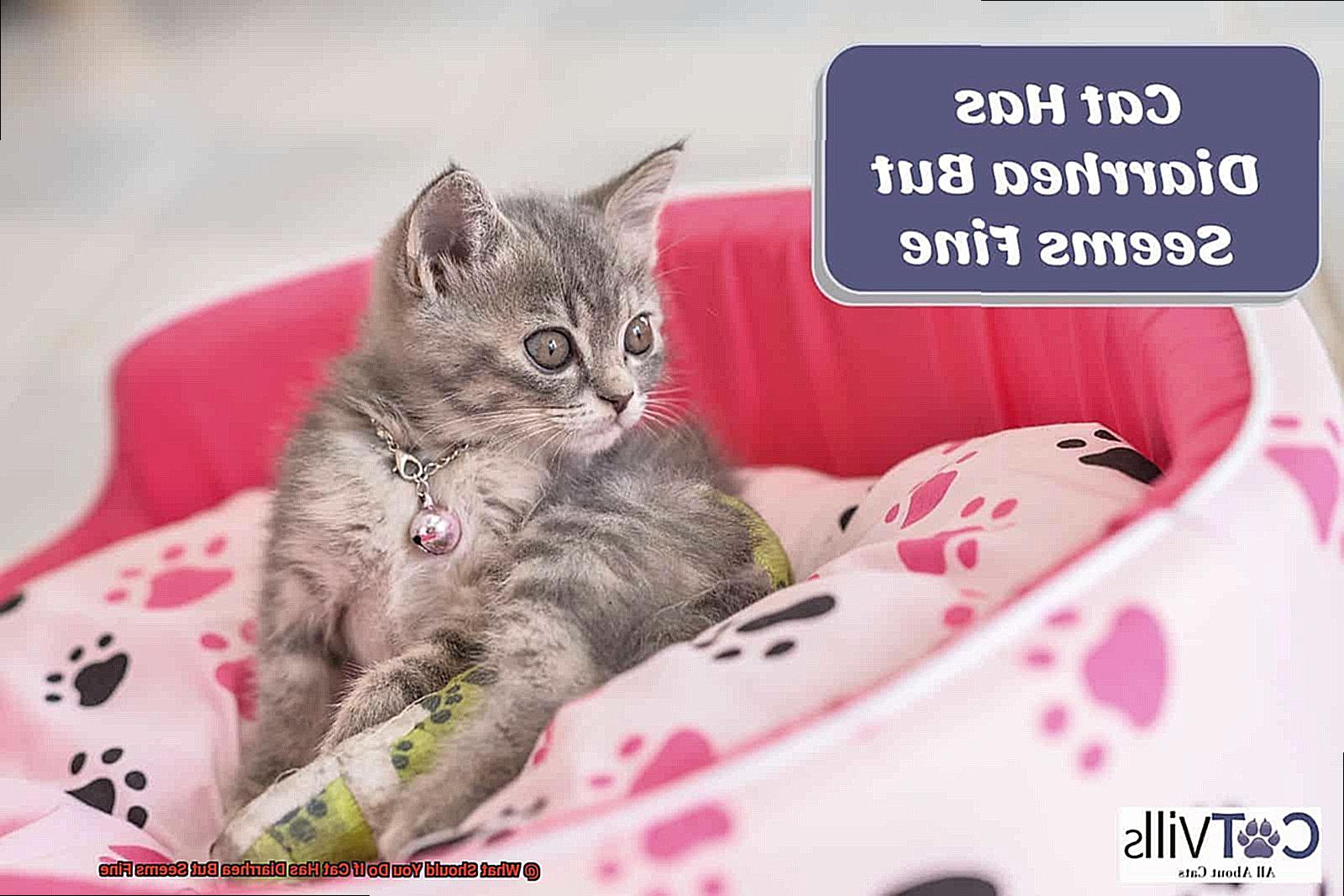
Here are some essential prevention tips to follow:

Proper Diet
Feeding your cat a balanced diet is crucial for preventing diarrhea. A high-quality cat food that contains all the necessary nutrients, including proteins, fats, and carbohydrates, will help keep their digestive system healthy.
Clean Water
Make sure your cat always has access to clean and fresh water. Dirty water can cause bacterial infections, leading to diarrhea.
Regular Exercise
Regular exercise can promote healthy bowel movements in cats, reducing the risk of diarrhea. Encouraging playtime and activity will not only benefit their digestive system but also their overall health and wellbeing.
Regular Vet Visits
Regular vet visits can help detect any underlying health issues that may cause diarrhea in cats. This includes gastrointestinal problems that may need medical attention.
Litter Box Maintenance
Keeping your cat’s litter box clean and hygienic can prevent the spread of bacteria and parasites that may cause diarrhea. Regular cleaning of their bedding and toys can also help prevent the spread of germs.
Limit Stress
Stress can cause digestive issues in cats, leading to diarrhea. Limiting stressors such as loud noises or changes in routine can help prevent diarrhea.
By following these preventative measures, you can reduce the risk of diarrhea in your cat and ensure their optimal health and wellbeing. However, if your cat does develop diarrhea, it’s important to monitor them closely and seek veterinary care if the symptoms persist or worsen.
Vx4ZseAteXQ” >
Conclusion
As cat owners, we want nothing but the best for our furry companions. However, when our cats experience diarrhea, it can be a cause for concern – especially if they seem otherwise fine. But fear not, there are several steps you can take to help your cat feel better and prevent further health issues.
One of the most common causes of diarrhea in cats is sudden dietary changes. That’s why it’s important to introduce new foods gradually and avoid spoiled or contaminated food at all costs. Additionally, infections, parasites, and stress can also trigger digestive upset in cats. So keep an eye out for potential triggers and don’t hesitate to consult with your veterinarian if your cat experiences chronic diarrhea or other concerning symptoms.
Thankfully, there are many home remedies that can help alleviate your cat’s upset stomach. Probiotics, canned pumpkin, boiled chicken and rice, electrolyte replacement solutions, and hydration are all great options to soothe their tummy troubles. Moreover, adjusting their diet by offering small frequent meals of easily digestible foods like boiled chicken and rice or high-fiber diets can regulate bowel movements.
It’s also crucial to maintain a clean litter box that is easily accessible for your cat. Regular vet visits can help detect underlying health issues that may cause diarrhea in cats before they become more serious problems. By following preventative measures such as feeding your cat a balanced diet, providing clean water and regular exercise while limiting stressors like loud noises or changes in routine you can reduce the risk of diarrhea.
In conclusion, by understanding what causes diarrhea in cats and taking preventative measures at home alongside seeking veterinary care when necessary you can help keep your feline friend healthy and free from discomfort.







